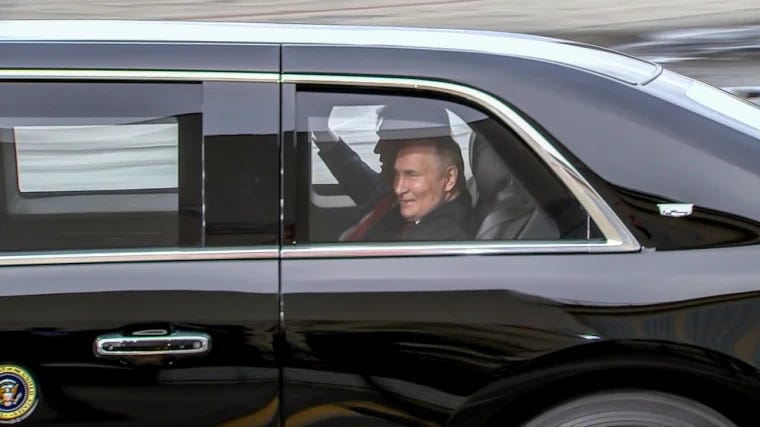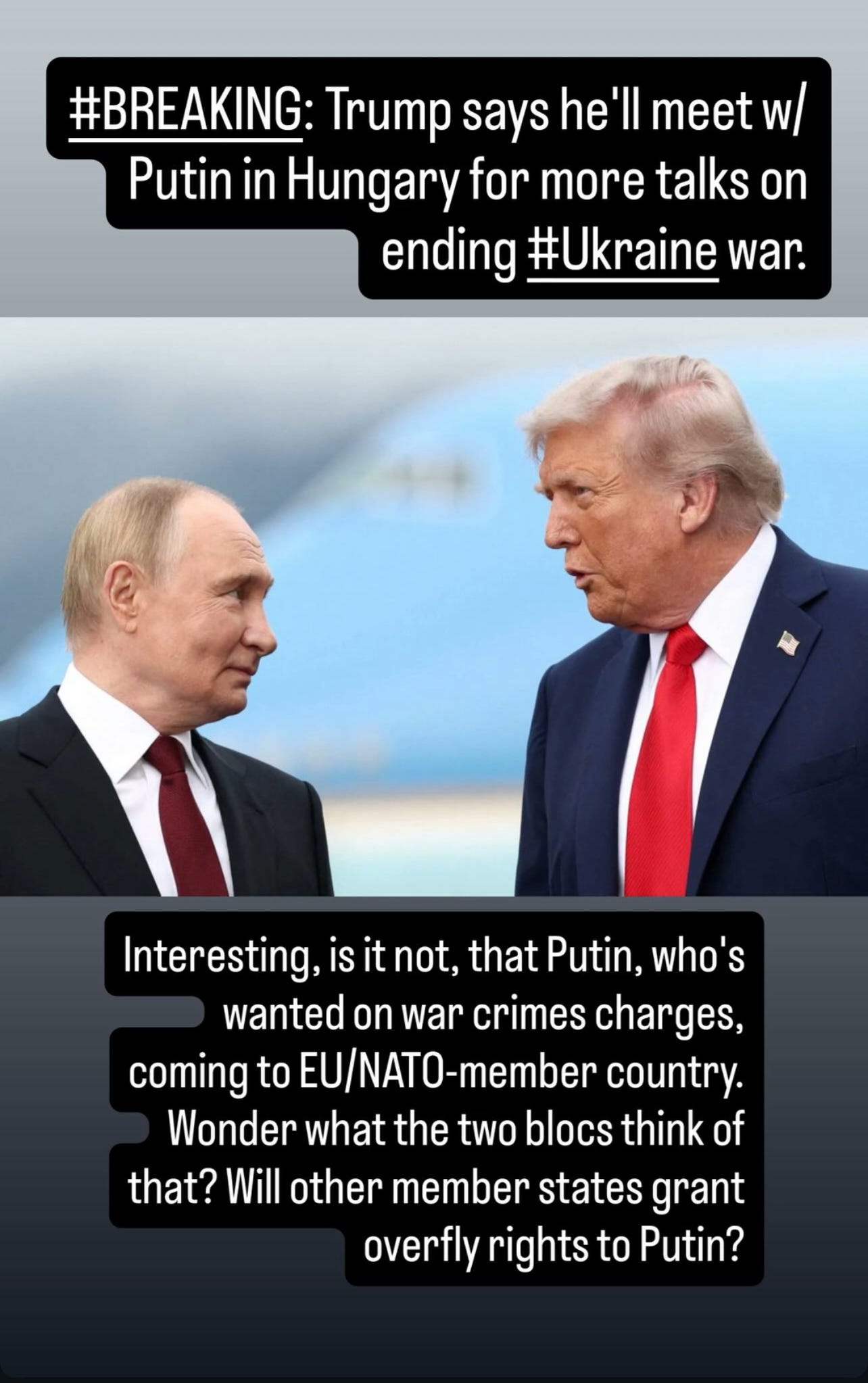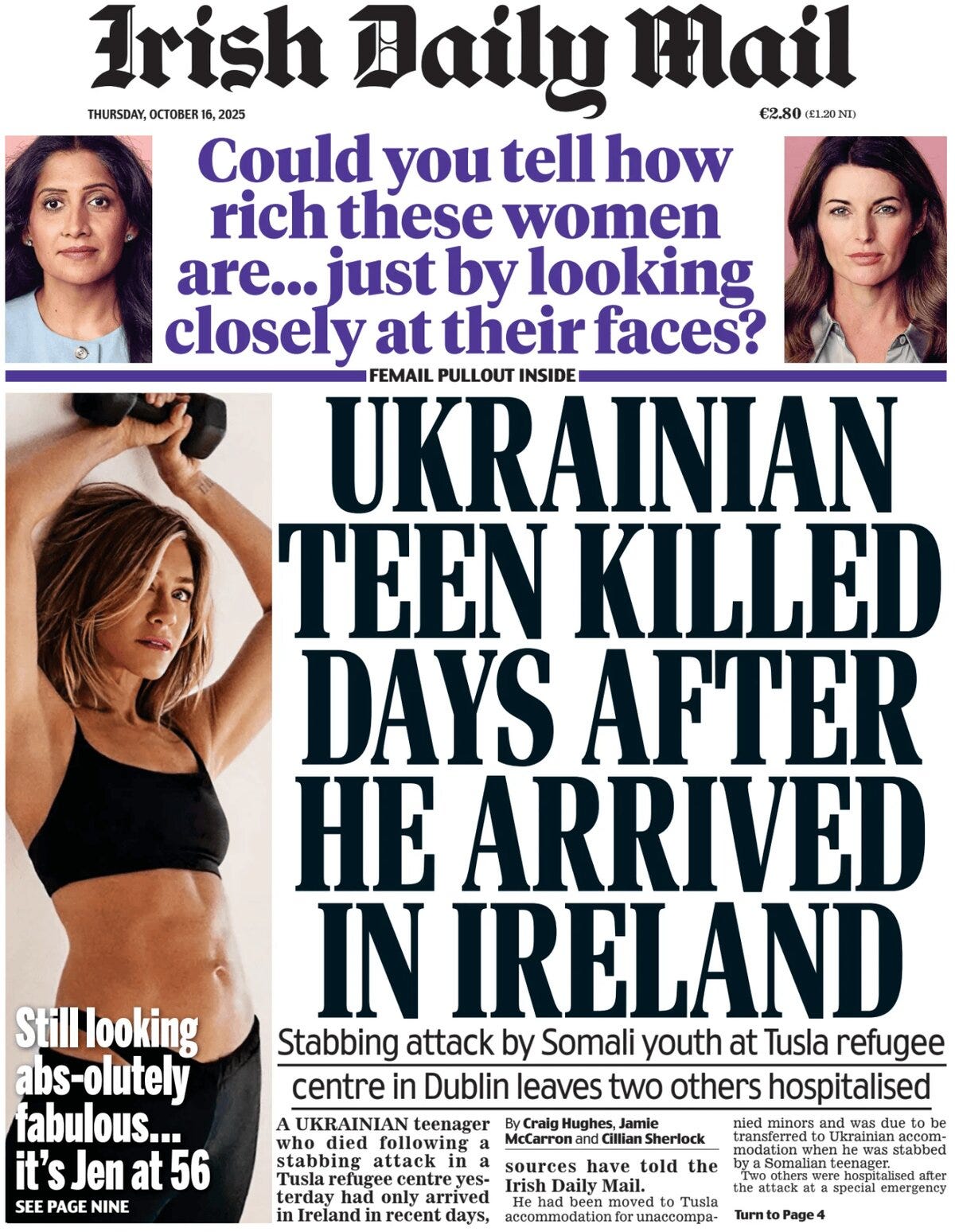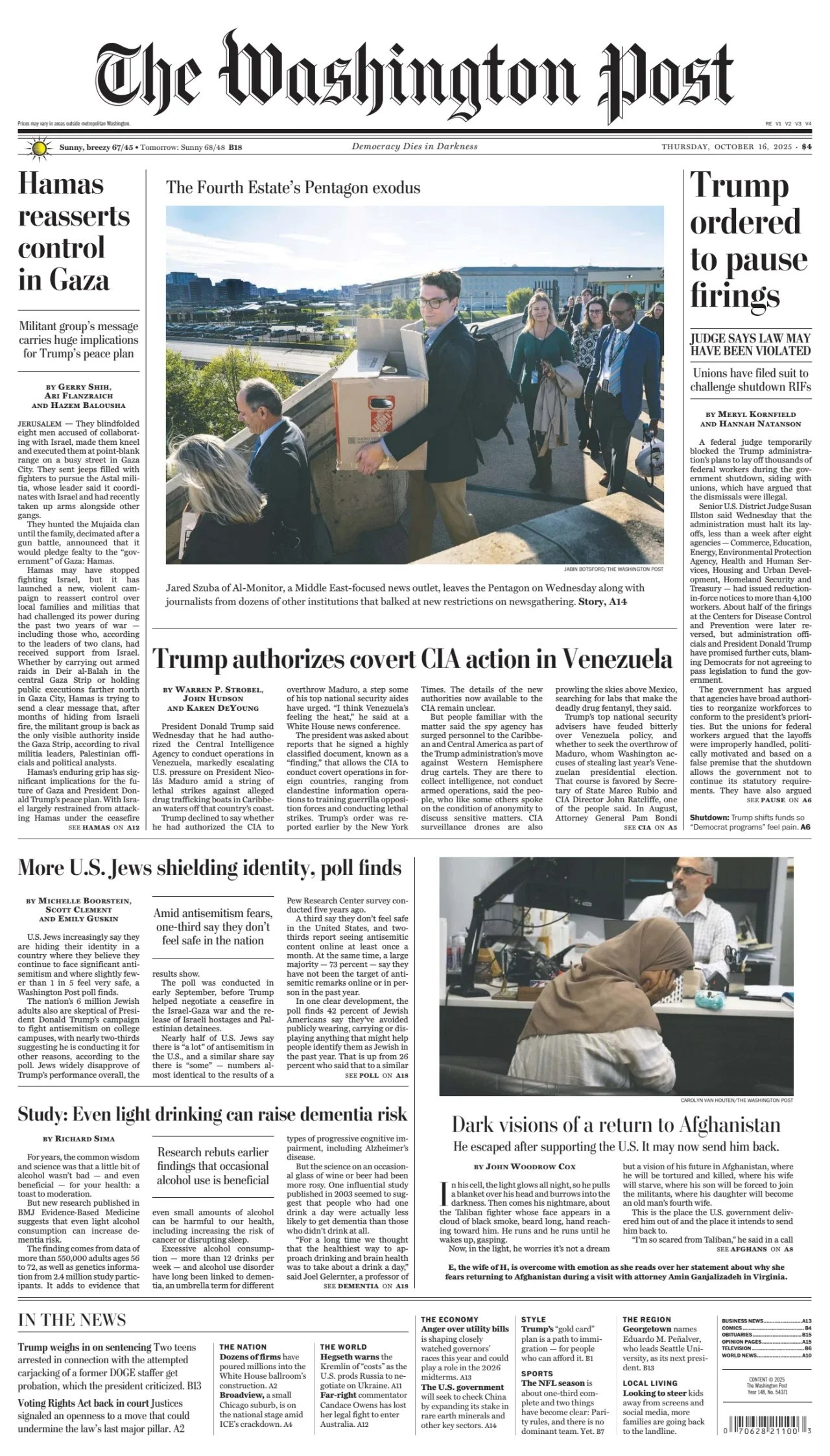The Return to Budapest: History’s Dark Echo in Trump’s Peace Push
Trump and Putin’s planned Hungary talks raise awkward questions — from overflight rights and a war-crimes suspect in NATO airspace to old ghosts from the Budapest Memorandum

In this World Briefing, we track a fast-moving geopolitical drama that now stretches from Washington to Moscow — and soon, to Budapest.
President Donald Trump says he will meet Russian President Vladimir Putin in Hungary for a second round of in-person talks to end what he calls the “inglorious war” in Ukraine. The announcement followed a “very productive” two-hour phone call between the two leaders — a call which, according to the Kremlin, was made at Russia’s request.
Kremlin aide Yuri Ushakov told Russian state television that Putin warned Trump that supplying Tomahawk missiles to Ukraine would “damage” the peace process and harm U.S.–Russia ties. The irony is hard to miss: even as Kyiv’s President Volodymyr Zelensky prepares to visit the White House seeking those very missiles — weapons with the range to strike Moscow itself — Trump is positioning himself as the broker of peace.
Putin’s visit to Hungary, a NATO and EU member, raises profound questions. As I posted on X: “Interesting, is it not, that Putin, who’s wanted on war crimes charges, is coming to an EU/NATO-member country. Wonder what the two blocs think of that? Will other member states grant overfly rights to Putin’s presidential aircraft?”
The choice of Budapest — suggested by Trump, eagerly accepted by Putin — is not lost on observers. As analyst Andreas Umland noted, “The U.S.’s choice of Budapest as the place to possibly decide Ukraine’s fate looks to many familiar with the issue like obvious trolling of Ukrainians. The Budapest Memorandum of 1994 was the key U.S. mistake that allowed Russia to start its war against Ukraine in 2014.”
For Trump, it’s another stage-managed attempt to cement his image as dealmaker-in-chief. For Putin, it’s an optics coup — legitimizing his role as a peace negotiator on Western soil. And for Ukraine, it’s yet another reminder that the war’s future may be debated in rooms far beyond its borders.
President Donald Trump said in a post to Truth Social on Thursday that he will meet with Russian President Vladimir Putin in Budapest, Hungary, for a second round of in-person talks to end the war in Ukraine. Trump’s comments came after a phone call with the Russian leader and a day before Ukrainian President Volodymyr Zelensky is set to visit the White House. Trump said he and Putin “agreed that there will be a meeting of our High Level Advisors, next week,” though the location has not been determined. The U.S. delegation will be led by Secretary of State Marco Rubio, after which Trump and Putin will meet, he said. “President Putin and I will then meet in an agreed upon location, Budapest, Hungary, to see if we can bring this ‘inglorious’ War, between Russia and Ukraine, to an end,” Trump wrote. Trump said his call with Putin was “very productive” and that he believed “great progress was made with today’s telephone conversation.” The two leaders met in Alaska in August. That summit did not ultimately result in any movement toward peace. Zelensky is set to visit the White House on Friday as Trump weighs whether to approve Tomahawk missiles for Ukraine. The long-range missiles could be used to launch strikes inside Russia, and if the U.S. supplied the weapons, it would mark a new level of support from the administration for Ukraine - NBC News
The phone call between Donald Trump and Vladimir Putin took place at Russia’s request, says a key Kremlin aide. In a broadcast on Russian state media, Yuri Ushakov says that during the phone call, Putin told Trump that supplying Tomahawk cruise missiles would harm the peace process and damage Russia-US ties. As a reminder, Tomahawk missiles have a range of 2,500 km (1,500 miles), which would put Moscow within reach of Ukraine. According to Ushakov, Budapest was suggested as the meeting location by Trump, and Putin immediately agreed. He also says US Secretary of State Marco Rubio and his Russian counterpart Sergey Lavrov will speak by phone initially, and the two countries will quickly prepare for a summit. When White House Press Secretary Karoline Leavitt was asked whether Trump believes a future meeting between Zelensky and Putin is still feasible, Leavitt said only that she believes “it is possible”. She would not, however, be drawn into questions on what conditions Trump believes would need to be in place for that to happen - BBC
India’s foreign ministry has said it is “not aware” of a phone call in which US President Donald Trump claimed Indian Prime Minister Narendra Modi agreed to stop purchasing Russian oil, the BBC reported. On Wednesday, Trump said his Indian counterpart had “assured me today” that it would end Russian oil imports, a move the US has pushed for in a bid to increase economic pressure on the Kremlin to end the war in Ukraine. But asked about the call on Thursday, an Indian government spokesman cast doubt on Trump’s account, saying he was “not aware of any conversation between the two leaders” taking place the previous day. The Indian government had earlier said discussions were still “ongoing” with the US over its Russian oil purchases.
Donald Trump is working on creating a “Ukraine Victory Fund,” which would be financed through new tariffs on China, The Telegraph reports. According to the outlet, Trump has instructed Treasury Secretary Scott Bessent to discuss the plan with European counterparts ahead of Ukrainian President Volodymyr Zelensky’s visit to Washington on Friday.
Israel’s prime minister has told a memorial for victims of the Hamas-led attack on 7 October 2023 that he is “determined” to secure the return of the dead hostages still in Gaza, and that the country will continue to fight terrorism with “full force”. Benjamin Netanyahu made the comments hours after Hamas returned the bodies of two more hostages but said it was not able to access the remaining 19. There has been fury in Israel that Hamas has not returned all the bodies in line with last week’s Gaza ceasefire deal, though the US has downplayed the suggestion it amounts to a breach. Also on Thursday, Donald Trump signalled he was willing to see fighting resume if Hamas “continues to kill people”.
Dozens of reporters from nearly all major news agencies cleared out their offices yesterday at the Pentagon, before turning in their press badges together at 4:00pm, after every news outlet beside one, refused to sign a “pledge” Tuesday from Defense Secretary Pete Hegseth agreeing to new rules and restrictions imposed on the Pentagon Press Corps. ABC, CBS, CNN, Fox, the Washington Post and others walked out rather than sign Hegseth’s Sept memo banning “info the DoD doesn’t explicitly OK,” even if unclassified. Outlets called it “without precedent.” As of Tuesday’s 5 p.m. deadline, only the MAGA-friendly One America News had said it would sign the Pentagon’s new draconian press policy. It essentially demands that the media be more responsible with classified information (the irony being that Defense Secretary Pete Hegseth has shown himself to be scandalously careless with sensitive information). As one journalist told Monocle Radio: “The policy is an inch away from telling journalists they need to show drafts of their articles.”
Conflict-ravaged Myanmar, where the United Nations estimates 40% of the population needs humanitarian assistance, once counted the U.S. as its largest humanitarian donor. Now, in Asia, it has become the epicenter of the suffering unleashed upon the world’s most vulnerable by President Donald Trump’s dismantling of the U.S. Agency for International Development. It is Myanmar’s children who have borne the brunt of the fallout. A study published in The Lancet journal in June said the U.S. funding cuts could result in more than 14 million deaths, including more than 4.5 million children under age 5, by 2030. Around 145,000 people are forced to live inside squalid, prison-like camps in the state of Rakhine by the ruling military. Most are members of Myanmar’s persecuted Rohingya minority, which was attacked by the military in 2017 in what the U.S declared a genocide.
A Ukrainian asylum seeker was fatally stabbed in a Dublin flat just four days after arriving and ‘tried to fend off the attacker’ as details emerge. The man was brutally stabbed to death in an apartment by his housemate. The Irish Sun has learned that Ukrainian Vadym Davydenko had a large amount of defensive wounds to his hands after he tried to fight the attacker off. But Davydenko, who was aged just 17, lost his battle for life after he was repeatedly stabbed to his face, head and chest in the Grattan Wood apartment block in Donaghmede, North Co Dublin at around 11am on Wednesday. The authorities are probing if he had been targeted by his housemate, also believed to be 17, in a row over food. Investigators were awaiting to question the suspect who was initially arrested at the scene but taken for treatment in hospital. They believe some of his injuries may have been self-inflicted. The youths were living in accommodation, which the child and family agency confirmed housed four unaccompanied children seeking International Protection. A source told the Irish Sun: “It was a vicious attack. The victim tried to fend off his attacker which is clear from his defensive injuries. But he had no chance.” Separately, the Irish Daily Mail reported that the suspect is a Somali teenager.
U.S. Federal agents chased a car through a residential neighborhood on the Southeast Side of Chicago Tuesday, and then intentionally crashed into the car in a risky maneuver restricted by some police departments nationwide. The maneuver was caught on local security cameras, which showed the car being hit by the feds’ vehicle, leading the occupants of the car to fall out while it was moving. The occupants then fled on foot as agents ran behind. The commotion attracted a crowd of onlookers and protesters, who converged near the scene of the crash at 105th Street and Avenue N in the East Side. A large number of armed Customs and Border Patrol agents responded to the crowd by hurling smoke grenades, shooting pepper balls and deploying at least three rounds of tear gas over the area, even with children and seniors in the area. At least four protesters were detained. In addition to residents, 13 CPD members also were overcome by tear gas while on the scene to try to de-escalate tensions between protesters and federal agents, police said. The situation Tuesday is the latest incident in which federal agents have brought aggressive immigration enforcement techniques to a Chicago neighborhood, and resorted to using tear gas and other munitions on crowds nearby. - Chicago Sun Times





